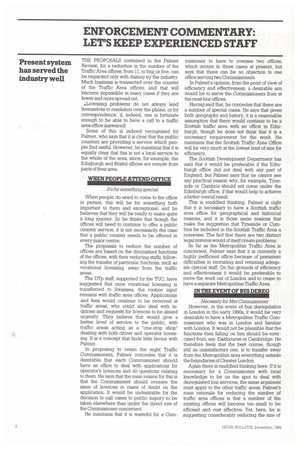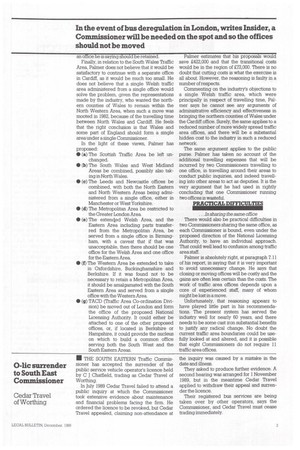ENFORCEMENT COMMENTARY: LET'S KEEP EXPERIENCED STAFF
Page 158

Page 159

If you've noticed an error in this article please click here to report it so we can fix it.
Present system has served the industry well
THE PROPOSALS contained in the Palmer Review, for a reduction in the number of the Traffic Area offices, from 11, to four or five, can be regarded only with dismay by the industry. Much business is transacted over the counter of the Traffic Area offices, and that will become impossible in many cases if they are fewer and more spread out.
,Licensing problems do not always lend themselves to resolution over the phone, or by correspondence; if, indeed, one is fortunate enough to be able to have a call to a traffic area office answered!
Some of this is indeed recognised by Palmer, who says that it is clear that the public counters are providing a service which people find useful. However, he maintains that it is equally clear that this is not a local service to the whole of the area, since, for example, the Edinburgh and Bristol offices are remote from parts of their area.
WHEN PEOPLE ATTEND OFFICE _It's for something special When people do need to come to the office in person, this will be for something both important to them and exceptional, and he believes that they will be ready to make quite a long journey. So he thinks that though the offices will need to continue to offer a public counter service, it is not necessarily the case that a public counter needs to be offered in every major centre.
The proposals to reduce the number of offices are based on the diminished functions of the offices, with their reducing staffs, following the transfer of particular functions, such as vocational licensing, away from the traffic areas.
The DTp staff, supported by the TUC, have suggested that once vocational licensing is transferred to Swansea, the routine input remains with traffic area offices. Applications and fees would continue to be received at traffic areas, who could also deal with inquiries and requests for licences to be issued urgently. They believe that would give a better level of service to the public, with traffic areas acting as a "one-stop shop" dealing with both driver and operator licensing. It is a concept that finds little favour with Palmer.
In proposing to retain the eight Traffic Commissioners, Palmer concedes that it is desirable that each Commissioner should have an office to deal with applications for operator's licences and all questions relating to them. He says that the main reason for this is that the Commissioner should oversee the issue of licences in cases of doubt on the application. It would be undesirable for the decision to call cases to public inquiry to be taken elsewhere than under the direct eye of the Commissioner concerned.
He maintains that it is wasteful for a Corn missioner to have to oversee two offices, which occurs in three cases at present, but says that there can be no objection to one office serving two Commissioners.
In Palmer's opinion, from the point of view of efficiency and effectiveness, a desirable aim would be to serve the Commissioners from at the most four offices.
Having said that, he concedes that there are a number of special cases. He says that given both geography and history, it is a reasonable assumption that there would continue to be a Scottish traffic area with an office in Edinburgh, though he does not think that it is a necessary requirement for the work. He maintains that the Scottish Traffic Area Office will be very much at the lowest limit of size for efficiency.
The Scottish Development Department has said that it would be preferable if the Edinburgh office did not deal with any part of England, but Palmer says that he cannot see any practical reason why, for example, Tyneside or Cumbria should not come under the Edinburgh office, if that would help to achieve a better overall result.
This is muddled thinking. Palmer is right that it is necessary to have a Scottish traffic area office for geographical and historical reasons, and it is those same reasons that make the suggestion that Tyneside or Cumbria be included in the Scottish Traffic Area a nonsense. The fact that there are two distinct legal systems would of itself create problems.
So far as the Metropolitan Traffic Area is concerned, Palmer says that it is currently a highly inefficient office because of persistent difficulties in recruiting and retammg adequate clerical staff. On the grounds of efficiency and effectiveness it would be preferable to move the work out of London and to cease to have a separate Metropolitan Traffic Area.
IN THE EVENT OF BUS DEMO
. . .Necessity for Met Commissioner However, in the event of bus deregulation in London in the early 1990s, it would be very desirable to have a Metropolitan Traffic Commissioner who was in London and familiar with London. It would not be plausible that the functions then falling on him should be exercised from, say, Eastbourne or Cambridge. He therefore feels that the best course, though still an unsatisfactory one, is to transfer away from the Metropolitan area everything outside the boundaries of Greater London.
Again there is muddled thinking here. If it is necessary for a Commissioner with local knowledge to be on the spot to deal with deregulated bus services, the same argument must apply to the other traffic areas. Palmer's main rationale for reducing the number of traffic area offices is that a number of the existing offices will become too small to be efficient and cost effective. Yet, here, he is suggesting considerably reducing the size of an office he is saying sboulabe retained.
Finally, in relation to the South Wales Traffic Area, Palmer does not believe that it would be satisfactory to continue with a separate office in Cardiff, as it would be much too small. He does not believe that a single Welsh traffic area administered from a single office would solve the problem, given the representations made by the industry, who wanted the northern counties of Wales to remain within the North Western Area, when such a move was mooted in 1982, because of the travelling time between North Wales and Cardiff. He feels that the right conclusion is that Wales and some part of England should form a single area under a single Commissioner.
• (a) The Scottish Traffic Area be left changed.
• (h) The South Wales and West Midland Areas be combined, possibly also taking in North Wales.
• (c) The Leeds and Newcastle offices be combined, with both the North Eastern and North Western Areas being administered from a single office, either in Manchester or West Yorkshire.
• (d) The Metropolitan Area be restricted to the Greater London Area.
• (a) The extencied Welsh Area, and the Eastern Area including parts transferred from the Metropolitan Area, be served from a single office in Birmingham, with a caveat that if that was unacceptable, then there should be one office for the Welsh Area and one office for the Eastern Area.
• (f) The Western Area be extended to take in Oxfordshire, Buckinghamshire and Berkshire. If it was found not to be necessary to retain a Metropolitan Area, It should be amalgamated with the South Eastern Area and served from a single office with the Western Area.
• (g) TACD (Traffic Area Co-ordination Division) be moved out of London and form the office of the proposed National Licensing Authority. It could either be attached to one of the other proposed offices, or, if located in Berkshire or Hampshire, it could provide the nucleus on which to build a common office serving both the South West and the South Eastern Areas.
• THE SOUTH EASTERN Traffic Commissioner has accepted the surrender of the public service vehicle operator's licence held by C J Chatfield, trading as Cedar Travel of Worthing.
In July 1989 Cedar Travel failed to attend a public inquiry at which the Commissioner took extensive evidence about maintenance and financial problems facing the firm. He ordered the licence to be revoked, but Cedar Travel appealed, claiming non-attendance at Palmer estimates that his proposals would save £422,000 and that the transitional costs would be in the region of E72,000. There is no doubt that cutting costs is what the exercise is all about. However, the reasoning is faulty in a number of respects.
Commenting on the industry's objections to a single Welsh traffic area, which were principally in respect of travelling time, Palmer says he cannot see any arguments of administrative efficiency and effectiveness in bringing the northern counties of Wales under the Cardiff office. Surely, the same applies to a reduced number of more widely spread traffic area offices, and there will be a substantial hidden cost to the industry in such a reduced network.
The same argument applies to the public purse. Palmer has taken no account of the additional travelling expenses that will be incurred by two Commissioners travelling to one office, in travelling around their areas to conduct public inquiries, and indeed travelling into other areas to act as deputies. It is the very argument that he had used in rightly concluding that one Commissioner running two offices is wasteful.
PRACTICAL DIFFICULTIES
.In sharing the same office
There would also be practical difficulties in two Commissioners sharing the same office, as each Commissioner is bound, even under the proposed direction of the National Licensing Authority, to have an individual approach. That could well lead to confusion among traffic area staff.
Palmer is absolutely right, at paragraph 7.11 of his report, in saying that it is very important to avoid unnecessary change. He says that closing or moving offices will be costly and the gains are often less certain than the costs. The work of traffic area offices depends upon a core of experienced staff, many of whom might be lost in a move.
Unfortunately, that reasoning appears to have played little part in his recommendations. The present system has served the industry well for nearly 60 years, and there needs to be some cast iron substantial benefits to justify any radical change. No doubt the current traffic area boundaries could be usefully looked at and altered, and it is possible that eight Commissioners do not require 11 traffic area offices.
the inquiry was caused by a mistake in the date and illness.
They asked to produce further evidence. A second hearing was arranged for 1 November 1989, but in the meantime Cedar Travel applied to withdraw their appeal and surrender the licence.
Their registered bus services are being taken over by other operators, says the Commissioner, and Cedar Travel must cease trading immediately.




































































































































































